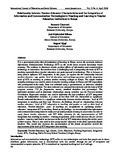| dc.description.abstract | It is a government policy that all institutions of learning in Kenya, across the curricula embrace Information Communication Technology (ICT) as the world moves towards knowledge based economy. The evidence in literature reveals positive effects of information and communication technology in instruction.But teachers have a challenging task in integrating the tools of ICT in teaching especially those teacher educators not quite exposed to technology.
This is because so many factors influence ICT integration. In this paper, we explore the the relationship between teacher-educators’ age, gender, level of education, and teaching experience and the integration level of ICTs in teaching
in primary teacher training colleges in Kenya. The simple random sampling technique was used to select six teacher training colleges in Kenya and 169 respondents who participated in the study. Data was collected using a questionnaire, an interview schedule and an observation schedule. The data collected was analyzed descriptively with the help of SPSS program version 17.0 for frequencies, means, standard deviation and percentages. The
inferential statistics used to determine relationships among variables was the Pearson moment Correlation. Regression analysis was used to determine the best predictors of ICT integration among the independent variables. A p-value of less than 0.05 was interpreted as significant. Results indicated that there is a significant relationship between teacher-educators’ level of ICT integration in teaching and their age. However, the findings showed no relationships between teacher educators’ level of ICT integration in teaching and gender as well as their
level of education.Teacher-educators’ years of teaching are insignificant in explaining teacher-educators’ integration ICT in teaching.Based on the findings, we recommended that information and communication integration be made part of undergraduate training in universities in order to equip future teacher educators with ICT skills; planning for the implementation of ICT integration into teaching in teachers’ training programmes early would increase the pre-service
teachers’ expertise and lead to an increase in the level of ICT integration during the earlier years of their careers. There is also need to hire young teacher-educators to the field, especially female teachers. This would also increase the representation of the female perspective toward the improvement of the level of ICT integration into teaching. | en_US |

